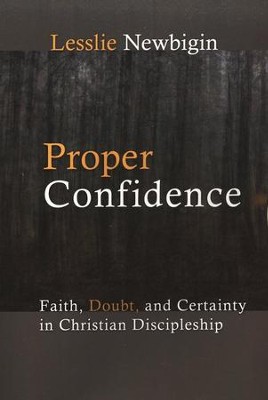My last post was on the faith and doubt, and how both are part of what it means to be human. The concepts are not specifically religious, and apply to all human being, religious or not, contrary to secularist assertions. Similar assertions, in effect, have implications for how we think about the concept of certainty as well. A recent article at The Gospel Coalition about a book by the late Lesslie Newbegin opened my eyes to how important this is. Since I wrote my book, I’ve experienced push back from some Christians who almost seem offended at the confidence I have in my faith, and that I can confidently pass on that confidence to my children. Now I know why: We’ve all accepted the epistemological presuppositions of the Enlightenment, and confuse confidence with certainty. Let me explain.

The article, by John Inazu, a professor of law and religion at Washington University in St. Louis, perfectly explains the issue in a few short words:
Drawing from the philosopher of science Michael Polanyi, Newbigin distinguishes confidence from post-Cartesian understandings of certainty. Evangelical culture too often conflates these terms in unhelpful and unhealthy ways. Faith depends on confidence, not certainty.
Most people don’t know what “post-Cartesian” means, let alone how it affects our understanding of certainty, or even why we think certainty is attainable. The term refers to Rene Descartes, a pious French Catholic 17th century philosopher (1596-1650), who in attempting to defend the faith made certainty the ultimate goal of his philosophy. He was certain certainty could be attained.
In the early 1600s what we’ve come to call the Enlightenment (everything prior was un-enlightened?) was gaining steam, and philosophers and thinkers were starting to question God’s existence. Descartes decided to build a philosophy that could stand up to the a-theists. Without getting into details he argued that we could have a sort of absolute certainty on which we could ground our belief in God. We are still living with the consequences of his well-intended failure. He didn’t realize he was allowing his intellectual enemies to determine the terms of the debate, that the issue at hand in relationship to our belief in God was certainty.
The hubris of Enlightenment thinkers was that certainty was possible because of the all powerful thing we call “science.” The non-sequitur goes like this: If science can prove it, we can be absolutely certain, if not, we can’t be certain at all. This is of course self-refuting because scientific knowledge can always be falsified by the next scientific discovery. Just ask Newton, and all his followers who thought his was the last word on physics, until this guy named Einstein came along in the early 20th century; not so certain after all.
Certainty is never absolute because human beings are finite creatures. We have limited knowledge, limited experience, limited insight, limited everything! That’s why distinguishing certainty from confidence, as Newbigin did, is so helpful. To say we can’t be certain is not to say we can’t be confident. This is so obvious as to hardly have to be argued, but since the Enlightenment we’ve been so immersed in the concept that certainty is necessary for knowledge, that we don’t understand the difference. Big difference. Huge difference.
Related to faith and doubt, confidence can be attained to a greater or lesser degree depending on many things. What is required is basically how I define faith: trust based on adequate evidence. Certainty is the enemy of trust because it assumes we can know things without it, that we don’t have to trust because we can know. So speaking or thinking in terms of certainty is unnecessary, and confusing certainty with confidence is “unhelpful and unhealthy” because it invites doubt. We assume if we can’t have total certainty then something must be wrong with my “faith.” Confidence on the other hand accepts that our knowledge is limited, and that we must trust others to one degree or another for everything we know.
There is something deeply ironic happening in the 21st century West. The secular culture assumes and asserts that Christianity is a teetering relic of the ancient past with no validity in our modern scientific age. Many Christians are unfortunately influenced by such nonsense, and lack confidence in their faith. The irony is that there has never been a time in the history of the Church when confidence in our faith can be so well grounded. Apologetics resources that help us defend the truth claims of Christianity are practically infinite and available to anyone with a little effort. The evidence (historical, textual, archaeological, philosophical, psychological, scientific, and more) that what we believe is true has never been stronger. We don’t need certainty because we can have well founded confidence.


Recent Comments